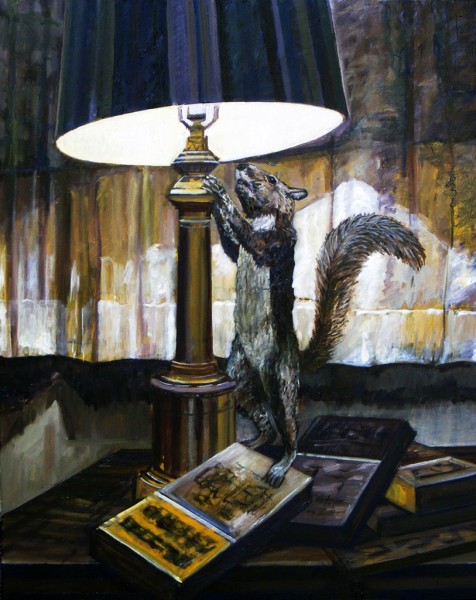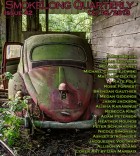In early spring you’ll spot it—pink, an inch long and squirming—under the largest tree on the street. You’ll handle it with rubber gloves, bring it home and skim simple on-line instruction for fostering. Keep it warmer than you keep yourself: a heating pad on low or a hot water bottle. Find a foot-long box and line it with soft fabric. Make a pocket in the fabric with your fist. Keep the box covered and know that when you aren’t there to watch, the infant inside might fumble out blind and roll into a cold corner where you’d never find it in time. Think you’ll do everything you can and know you might not be enough. Make a homemade formula: teaspoon of salt, three teaspoons of sugar and a quart of warm water. Squirt it through a syringe onto the gums. Remember it could easily aspirate. Beware of the small, weak lungs. Wipe the genitals and anus with a warm cloth until the bowels release. Think how delicate life is. Check the nose and mouth for dryness. Think how easily we die. Test hydration by pinching the skin. Remove fleas or maggots by a comb or tweezers. Think of how much ugly there is to fight off.
When it begins to grow it sprouts hair kind of like what you find on your legs after a week unshaven, but denser. Learn fast this will not be a fur soft to pet. It’s pin-small eyes open and you realize this small thing makes you ecstatic. Two amber points will blink rapidly and you will believe it sees you. Know from what you read that what it actually sees is a roving red-green smudge. Know it’s not yet capable of gauging distance. Know this, though this is not where your thoughts go. Not now.
What else you know: the squirrel symbolically means diligence and patience. It takes a unique strength to chew the meat from a hard nut. Feel inspired by how simple and instinctual the actions that keep the air moving through us are. Skip less trips to the gym. Think less about how time goes so fast and you continue to go so slow. Watch as it breaks its first peanut at the foot of your bed. Watch as it realizes it can leap from the bed to the nightstand and up into the dark of your closet. Believe in the goodness of symbols. Find symbolism in the long leaps—from chair to bookcase, from one room to another room. Believe it can’t hurt to try and protect that.
The day it chews through your laptop wire marks the first day you describe it with the adjective jumpy. From here on find yourself calling out its name more frequently and with a more demanding tone. Think of this voice you use, question whether or not this animal knows it—the only human sound in its life. No, you decide. Begin to believe it’s not very smart since it doesn’t register your voice and then change your mind, thinking it’s so smart it’s realized how to ignore you.
Come to understand this animal holds no commitments. This animal’s become far flung, anxious, made of long leaps, combative with carpets. This animal chews everything you need intact. Think, if only you could contain its moving with a wheel or harness. But, no. This squirrel, now full grown and pacing, begins to remind you of your sleepless mind late at night: no off switch, no deescalating, no wrangling, even in a contained space, and everything outside hangs so large and not necessarily seen in true color or true distance. Nothing about it is your fault but you are no savior and this is when you know it. You go to some warmth in the cavity of your throat. You hear the words control yourself.
So you read how to build an indoor a cage out of chicken wire. A large cage you deem worthy of its pacing and jumpy nature. You place it between your living room and kitchen, where it can see you most. To walk past you must squeeze between the wire and the wall, the cage scratching you nearly every time. On your legs you collect small signs of an obstacle of your own making.
At night in bed, over the white noise of your humidifier, you hear its incisors clicking against the chicken wire. You bring this clicking into your sleep. You take this clicking into you dreams, where it nips open your arms, you heart—everything inside you spilling out. A mess worse than anything a squirrel could leave. In the morning while you shower you look down at the scratches on your legs and realize these cuts show no origin—they could be from anywhere. Opening the bathroom door, it jolts and you jolt back.
In a cat carrier, you take it back to the largest tree on the street and open the small door. It jumps up the trunk to a limb and quickly jumps back down, landing on the sidewalk where it stops and sniffs the concrete. With this you are convinced it doesn’t know what it wants. But you believe it will come to know with time, so you walk another direction. Looking back you see it trip over a tree root and you realize you wouldn’t know it again if you saw it.



 The core workshop of SmokeLong Fitness is all in writing, so you can take part from anywhere at anytime. We are excited about creating a supportive, consistent and structured environment for flash writers to work on their craft in a community. We are thrilled and proud to say that our workshop participants have won, placed, or been listed in every major flash competition. Community works.
The core workshop of SmokeLong Fitness is all in writing, so you can take part from anywhere at anytime. We are excited about creating a supportive, consistent and structured environment for flash writers to work on their craft in a community. We are thrilled and proud to say that our workshop participants have won, placed, or been listed in every major flash competition. Community works.